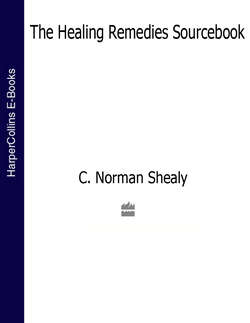Читать книгу The Healing Remedies Sourcebook: Over 1,000 Natural Remedies to Prevent and Cure Common Ailments - C. Shealy Norman - Страница 47
ОглавлениеCHINESE HERBAL MEDICINE
CHINESE MEDICINE IS AN ANCIENT system of healing—acupuncture and Chinese herbal medicine grew up in tandem over 2,000 years. It is based on the philosophy of a very different civilization from our own, a civilization that perceived people as either “in harmony” or “out of harmony” with themselves and their surroundings. Traditional Chinese Medicine (TCM) sees disease in terms of patterns of disharmony, and so attempts to restore the balance in the person who is sick. Energy is believed to flow through channels called meridians, through which disease may be treated.
WHAT IS CHINESE HERBAL MEDICINE?
TCM uses terminology that sounds strange to most Westerners. Instead of talking about rheumatic diseases or neurological diseases, it classifies diseases as being caused by Wind, Heat, Dampness, or Cold. Instead of talking about rheumatism in the knee joint, it may classify it as Cold-Damp in the Stomach meridian. Western medicine focuses on a specific cause for a specific disease, and when it isolates that cause or agent it tries to control or destroy it. Chinese medicine is also concerned with the cause, but it focuses on the patient’s response to that disease entity, both physiological and psychological. All the relevant information, including symptoms that may not seem related to the patients main complaint, is collected together to enable the practitioner to discover the pattern of disharmony within that person, which can then be addressed by Chinese medicine. For instance, two patients coming with asthma may have completely different diagnoses according to Chinese medicine. The one with a pale face, prone to catching colds (Lung Qi Deficiency) will be given a completely different herbal formula to the patient who has a dry cough, thirst, and breathlessness on exertion (Lung Yin Deficiency). TCM does treat the same diseases—to a large extent people have the same problems the world over—it just perceives them in an entirely different way.
YIN AND YANG
Chinese medicine is based on the philosophy of yin and yang. These are the dual forces in the universe, seen both within nature and in human beings. They are used to explain the ongoing process of natural changes—yang is more prevalent during the day, while yin forces are more prevalent at night. There is no absolute yin or yang in living things—a cold yin-type illness may have aspects of yang, such as sharp, forceful contractions. Yin and yang both depend on each other and keep each other under control. However, it is when they go seriously out of balance and do not correct themselves that there is disease.
Everything has a yin and a yang aspect—for instance:
A SHORT HISTORY
The earliest herbal formulas in China were found to have been written down in the 3rd century B.C.E. In fact, the main book of the theory of Chinese medicine—the Yellow Emperor’s Inner Classic—was compiled in the 1st century c.e., and is still taught in schools of TCM. Over the centuries, leading physicians have written down both herbal and acupuncture formulas, which explains the vast bulk of Chinese medicine reference books. The Imperial Grace Formulary of the Tai Pang Era (around 985 c.e.), for example, contains 16,834 entries, many of which are still commonly referred to today.
The early herbal formulas were very simple and elegant, while the later ones are much more complicated. Either type can be useful, depending on the patient and the physician’s preferred manner of working. A practitioner of TCM, or someone practicing Chinese herbal medicine specifically, will diagnose the patient’s pattern of disharmony, find the tried and tested prescription which is closest to that patient’s pattern, and add or subtract herbs to make it more suitable for that individual. Herbs are seldom used singly; they are usually combined in prescriptions containing 4–16 substances.
THE CHINESE THEORY OF LIFE
The Chinese believe that every living being is sustained by a basic Life Force, called “qi” (pronounced “chee”). Human beings receive their qi from a mixture of the influences of both Heaven and Earth. Therefore, we do have an element of the divine in us, which separates us from the animals. Chinese medicine works with the qi that we have to make us better. It may unblock the flow of qi in the body if it is stuck, or it may nourish qi if it is deficient. We are born with a fixed amount of qi inherited from our parents (Yuan Qi—source, or genetic, qi). This is used both as our “reserve tank” and as a catalyst in most of the chemical processes of the body. We can nourish our Yuan Qi, though we cannot add to it. We may, however, deplete it through bad living practices—long-term lack of sleep or good food, drugs, drink, or years of excessive sex. The Chinese believe that this source qi is stored in the Kidneys (where its substance is called Jing or essence), and its functions include the control of sexual and reproductive activity in the body. We get our day-to-day qi from the air we breathe (Gong Qi) and the food we eat (Gu Qi).
Qi permeates the entire body; it directs the blood, nerve, and lymphatic systems (Ying Qi). It protects us from catching viruses (Wei Qi), and fights them if they get into the body. It transforms the food we eat into bodily substances—blood, tears, sweat, and urine—keeps organs in their proper place, and prevents excessive loss of sweat. Qi keeps the body warm and is naturally the source of movement and growth, as it has all these functions. We also use it in TCM to describe the functions of any Organ—for instance, Lung qi may be “weak” or Liver qi “blocked.”
